The Significance of Culture in Global Business: A Review
VerifiedAdded on 2021/06/16
|7
|2596
|53
Essay
AI Summary
This essay provides a literature review on the role of culture in the business world, exploring cross-cultural management, global leadership, and the impact of cultural diversity. It examines how businesses navigate cultural differences in the era of globalization, emphasizing the importance of intercultural communication and adaptation. The review covers topics such as the effect of culture on international business, communication challenges arising from cultural disparities, and strategies for managing cultural diversity within organizations. It highlights the need for businesses to develop cross-cultural competencies to achieve global competitiveness and success, focusing on elements like values, beliefs, attitudes, and communication styles. The essay concludes by emphasizing the importance of addressing cultural dimensions to reduce conflicts and promote effective leadership and management in global organizations. Desklib offers a wide range of resources, including past papers and solved assignments, to support students in their academic pursuits.
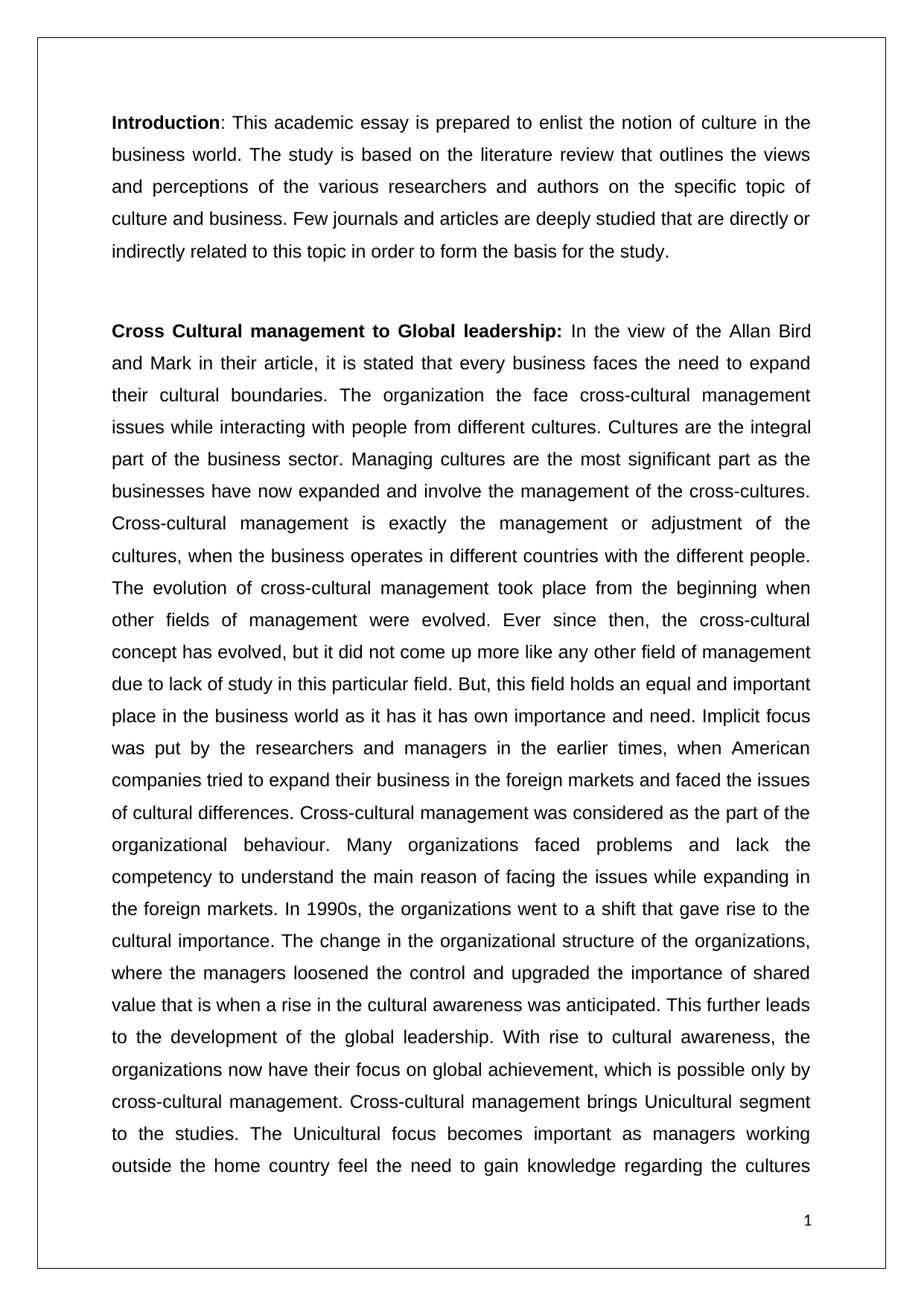
Introduction: This academic essay is prepared to enlist the notion of culture in the
business world. The study is based on the literature review that outlines the views
and perceptions of the various researchers and authors on the specific topic of
culture and business. Few journals and articles are deeply studied that are directly or
indirectly related to this topic in order to form the basis for the study.
Cross Cultural management to Global leadership: In the view of the Allan Bird
and Mark in their article, it is stated that every business faces the need to expand
their cultural boundaries. The organization the face cross-cultural management
issues while interacting with people from different cultures. Cultures are the integral
part of the business sector. Managing cultures are the most significant part as the
businesses have now expanded and involve the management of the cross-cultures.
Cross-cultural management is exactly the management or adjustment of the
cultures, when the business operates in different countries with the different people.
The evolution of cross-cultural management took place from the beginning when
other fields of management were evolved. Ever since then, the cross-cultural
concept has evolved, but it did not come up more like any other field of management
due to lack of study in this particular field. But, this field holds an equal and important
place in the business world as it has it has own importance and need. Implicit focus
was put by the researchers and managers in the earlier times, when American
companies tried to expand their business in the foreign markets and faced the issues
of cultural differences. Cross-cultural management was considered as the part of the
organizational behaviour. Many organizations faced problems and lack the
competency to understand the main reason of facing the issues while expanding in
the foreign markets. In 1990s, the organizations went to a shift that gave rise to the
cultural importance. The change in the organizational structure of the organizations,
where the managers loosened the control and upgraded the importance of shared
value that is when a rise in the cultural awareness was anticipated. This further leads
to the development of the global leadership. With rise to cultural awareness, the
organizations now have their focus on global achievement, which is possible only by
cross-cultural management. Cross-cultural management brings Unicultural segment
to the studies. The Unicultural focus becomes important as managers working
outside the home country feel the need to gain knowledge regarding the cultures
1
business world. The study is based on the literature review that outlines the views
and perceptions of the various researchers and authors on the specific topic of
culture and business. Few journals and articles are deeply studied that are directly or
indirectly related to this topic in order to form the basis for the study.
Cross Cultural management to Global leadership: In the view of the Allan Bird
and Mark in their article, it is stated that every business faces the need to expand
their cultural boundaries. The organization the face cross-cultural management
issues while interacting with people from different cultures. Cultures are the integral
part of the business sector. Managing cultures are the most significant part as the
businesses have now expanded and involve the management of the cross-cultures.
Cross-cultural management is exactly the management or adjustment of the
cultures, when the business operates in different countries with the different people.
The evolution of cross-cultural management took place from the beginning when
other fields of management were evolved. Ever since then, the cross-cultural
concept has evolved, but it did not come up more like any other field of management
due to lack of study in this particular field. But, this field holds an equal and important
place in the business world as it has it has own importance and need. Implicit focus
was put by the researchers and managers in the earlier times, when American
companies tried to expand their business in the foreign markets and faced the issues
of cultural differences. Cross-cultural management was considered as the part of the
organizational behaviour. Many organizations faced problems and lack the
competency to understand the main reason of facing the issues while expanding in
the foreign markets. In 1990s, the organizations went to a shift that gave rise to the
cultural importance. The change in the organizational structure of the organizations,
where the managers loosened the control and upgraded the importance of shared
value that is when a rise in the cultural awareness was anticipated. This further leads
to the development of the global leadership. With rise to cultural awareness, the
organizations now have their focus on global achievement, which is possible only by
cross-cultural management. Cross-cultural management brings Unicultural segment
to the studies. The Unicultural focus becomes important as managers working
outside the home country feel the need to gain knowledge regarding the cultures
1
Paraphrase This Document
Need a fresh take? Get an instant paraphrase of this document with our AI Paraphraser
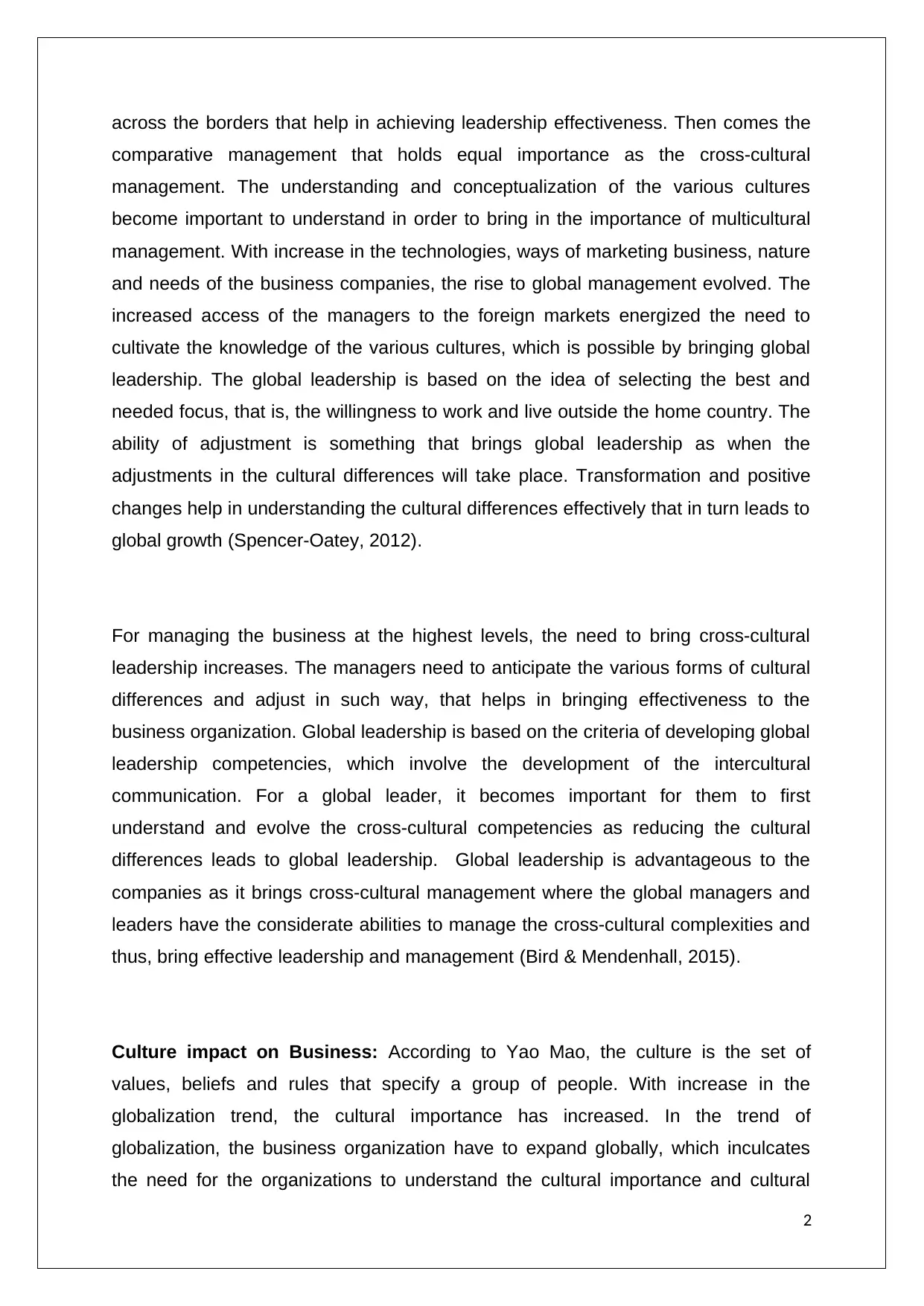
across the borders that help in achieving leadership effectiveness. Then comes the
comparative management that holds equal importance as the cross-cultural
management. The understanding and conceptualization of the various cultures
become important to understand in order to bring in the importance of multicultural
management. With increase in the technologies, ways of marketing business, nature
and needs of the business companies, the rise to global management evolved. The
increased access of the managers to the foreign markets energized the need to
cultivate the knowledge of the various cultures, which is possible by bringing global
leadership. The global leadership is based on the idea of selecting the best and
needed focus, that is, the willingness to work and live outside the home country. The
ability of adjustment is something that brings global leadership as when the
adjustments in the cultural differences will take place. Transformation and positive
changes help in understanding the cultural differences effectively that in turn leads to
global growth (Spencer-Oatey, 2012).
For managing the business at the highest levels, the need to bring cross-cultural
leadership increases. The managers need to anticipate the various forms of cultural
differences and adjust in such way, that helps in bringing effectiveness to the
business organization. Global leadership is based on the criteria of developing global
leadership competencies, which involve the development of the intercultural
communication. For a global leader, it becomes important for them to first
understand and evolve the cross-cultural competencies as reducing the cultural
differences leads to global leadership. Global leadership is advantageous to the
companies as it brings cross-cultural management where the global managers and
leaders have the considerate abilities to manage the cross-cultural complexities and
thus, bring effective leadership and management (Bird & Mendenhall, 2015).
Culture impact on Business: According to Yao Mao, the culture is the set of
values, beliefs and rules that specify a group of people. With increase in the
globalization trend, the cultural importance has increased. In the trend of
globalization, the business organization have to expand globally, which inculcates
the need for the organizations to understand the cultural importance and cultural
2
comparative management that holds equal importance as the cross-cultural
management. The understanding and conceptualization of the various cultures
become important to understand in order to bring in the importance of multicultural
management. With increase in the technologies, ways of marketing business, nature
and needs of the business companies, the rise to global management evolved. The
increased access of the managers to the foreign markets energized the need to
cultivate the knowledge of the various cultures, which is possible by bringing global
leadership. The global leadership is based on the idea of selecting the best and
needed focus, that is, the willingness to work and live outside the home country. The
ability of adjustment is something that brings global leadership as when the
adjustments in the cultural differences will take place. Transformation and positive
changes help in understanding the cultural differences effectively that in turn leads to
global growth (Spencer-Oatey, 2012).
For managing the business at the highest levels, the need to bring cross-cultural
leadership increases. The managers need to anticipate the various forms of cultural
differences and adjust in such way, that helps in bringing effectiveness to the
business organization. Global leadership is based on the criteria of developing global
leadership competencies, which involve the development of the intercultural
communication. For a global leader, it becomes important for them to first
understand and evolve the cross-cultural competencies as reducing the cultural
differences leads to global leadership. Global leadership is advantageous to the
companies as it brings cross-cultural management where the global managers and
leaders have the considerate abilities to manage the cross-cultural complexities and
thus, bring effective leadership and management (Bird & Mendenhall, 2015).
Culture impact on Business: According to Yao Mao, the culture is the set of
values, beliefs and rules that specify a group of people. With increase in the
globalization trend, the cultural importance has increased. In the trend of
globalization, the business organization have to expand globally, which inculcates
the need for the organizations to understand the cultural importance and cultural
2
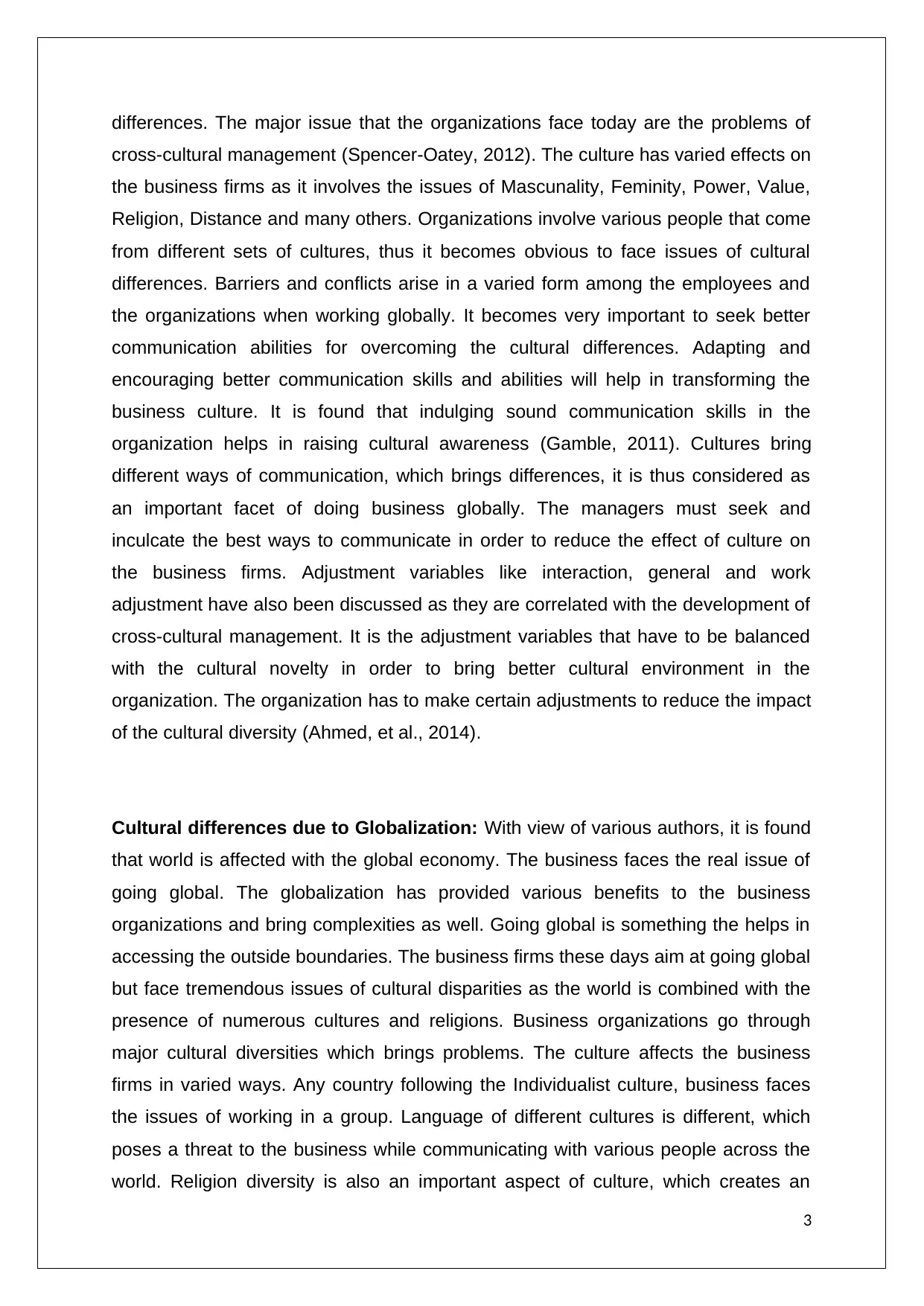
differences. The major issue that the organizations face today are the problems of
cross-cultural management (Spencer-Oatey, 2012). The culture has varied effects on
the business firms as it involves the issues of Mascunality, Feminity, Power, Value,
Religion, Distance and many others. Organizations involve various people that come
from different sets of cultures, thus it becomes obvious to face issues of cultural
differences. Barriers and conflicts arise in a varied form among the employees and
the organizations when working globally. It becomes very important to seek better
communication abilities for overcoming the cultural differences. Adapting and
encouraging better communication skills and abilities will help in transforming the
business culture. It is found that indulging sound communication skills in the
organization helps in raising cultural awareness (Gamble, 2011). Cultures bring
different ways of communication, which brings differences, it is thus considered as
an important facet of doing business globally. The managers must seek and
inculcate the best ways to communicate in order to reduce the effect of culture on
the business firms. Adjustment variables like interaction, general and work
adjustment have also been discussed as they are correlated with the development of
cross-cultural management. It is the adjustment variables that have to be balanced
with the cultural novelty in order to bring better cultural environment in the
organization. The organization has to make certain adjustments to reduce the impact
of the cultural diversity (Ahmed, et al., 2014).
Cultural differences due to Globalization: With view of various authors, it is found
that world is affected with the global economy. The business faces the real issue of
going global. The globalization has provided various benefits to the business
organizations and bring complexities as well. Going global is something the helps in
accessing the outside boundaries. The business firms these days aim at going global
but face tremendous issues of cultural disparities as the world is combined with the
presence of numerous cultures and religions. Business organizations go through
major cultural diversities which brings problems. The culture affects the business
firms in varied ways. Any country following the Individualist culture, business faces
the issues of working in a group. Language of different cultures is different, which
poses a threat to the business while communicating with various people across the
world. Religion diversity is also an important aspect of culture, which creates an
3
cross-cultural management (Spencer-Oatey, 2012). The culture has varied effects on
the business firms as it involves the issues of Mascunality, Feminity, Power, Value,
Religion, Distance and many others. Organizations involve various people that come
from different sets of cultures, thus it becomes obvious to face issues of cultural
differences. Barriers and conflicts arise in a varied form among the employees and
the organizations when working globally. It becomes very important to seek better
communication abilities for overcoming the cultural differences. Adapting and
encouraging better communication skills and abilities will help in transforming the
business culture. It is found that indulging sound communication skills in the
organization helps in raising cultural awareness (Gamble, 2011). Cultures bring
different ways of communication, which brings differences, it is thus considered as
an important facet of doing business globally. The managers must seek and
inculcate the best ways to communicate in order to reduce the effect of culture on
the business firms. Adjustment variables like interaction, general and work
adjustment have also been discussed as they are correlated with the development of
cross-cultural management. It is the adjustment variables that have to be balanced
with the cultural novelty in order to bring better cultural environment in the
organization. The organization has to make certain adjustments to reduce the impact
of the cultural diversity (Ahmed, et al., 2014).
Cultural differences due to Globalization: With view of various authors, it is found
that world is affected with the global economy. The business faces the real issue of
going global. The globalization has provided various benefits to the business
organizations and bring complexities as well. Going global is something the helps in
accessing the outside boundaries. The business firms these days aim at going global
but face tremendous issues of cultural disparities as the world is combined with the
presence of numerous cultures and religions. Business organizations go through
major cultural diversities which brings problems. The culture affects the business
firms in varied ways. Any country following the Individualist culture, business faces
the issues of working in a group. Language of different cultures is different, which
poses a threat to the business while communicating with various people across the
world. Religion diversity is also an important aspect of culture, which creates an
3
⊘ This is a preview!⊘
Do you want full access?
Subscribe today to unlock all pages.

Trusted by 1+ million students worldwide
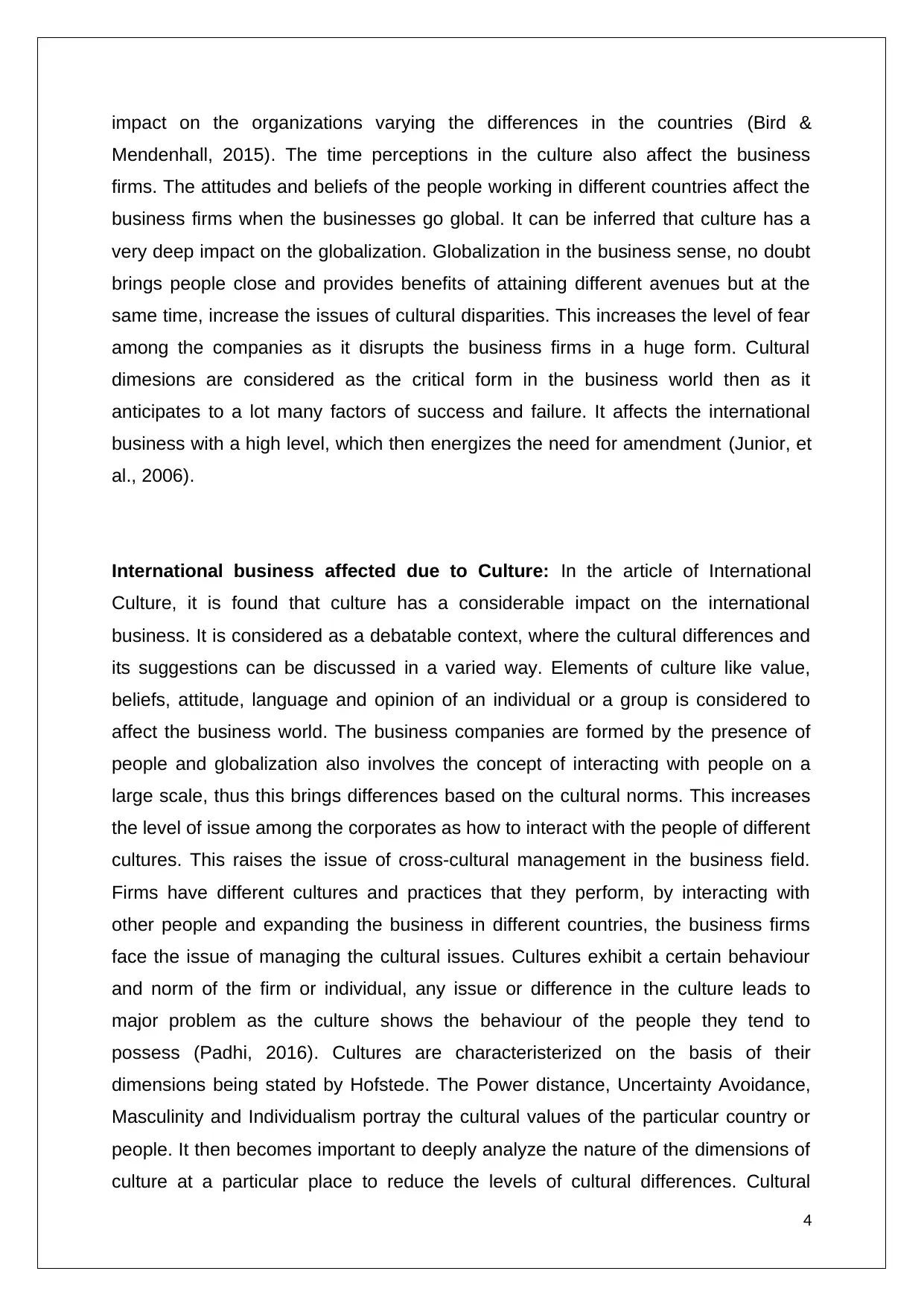
impact on the organizations varying the differences in the countries (Bird &
Mendenhall, 2015). The time perceptions in the culture also affect the business
firms. The attitudes and beliefs of the people working in different countries affect the
business firms when the businesses go global. It can be inferred that culture has a
very deep impact on the globalization. Globalization in the business sense, no doubt
brings people close and provides benefits of attaining different avenues but at the
same time, increase the issues of cultural disparities. This increases the level of fear
among the companies as it disrupts the business firms in a huge form. Cultural
dimesions are considered as the critical form in the business world then as it
anticipates to a lot many factors of success and failure. It affects the international
business with a high level, which then energizes the need for amendment (Junior, et
al., 2006).
International business affected due to Culture: In the article of International
Culture, it is found that culture has a considerable impact on the international
business. It is considered as a debatable context, where the cultural differences and
its suggestions can be discussed in a varied way. Elements of culture like value,
beliefs, attitude, language and opinion of an individual or a group is considered to
affect the business world. The business companies are formed by the presence of
people and globalization also involves the concept of interacting with people on a
large scale, thus this brings differences based on the cultural norms. This increases
the level of issue among the corporates as how to interact with the people of different
cultures. This raises the issue of cross-cultural management in the business field.
Firms have different cultures and practices that they perform, by interacting with
other people and expanding the business in different countries, the business firms
face the issue of managing the cultural issues. Cultures exhibit a certain behaviour
and norm of the firm or individual, any issue or difference in the culture leads to
major problem as the culture shows the behaviour of the people they tend to
possess (Padhi, 2016). Cultures are characteristerized on the basis of their
dimensions being stated by Hofstede. The Power distance, Uncertainty Avoidance,
Masculinity and Individualism portray the cultural values of the particular country or
people. It then becomes important to deeply analyze the nature of the dimensions of
culture at a particular place to reduce the levels of cultural differences. Cultural
4
Mendenhall, 2015). The time perceptions in the culture also affect the business
firms. The attitudes and beliefs of the people working in different countries affect the
business firms when the businesses go global. It can be inferred that culture has a
very deep impact on the globalization. Globalization in the business sense, no doubt
brings people close and provides benefits of attaining different avenues but at the
same time, increase the issues of cultural disparities. This increases the level of fear
among the companies as it disrupts the business firms in a huge form. Cultural
dimesions are considered as the critical form in the business world then as it
anticipates to a lot many factors of success and failure. It affects the international
business with a high level, which then energizes the need for amendment (Junior, et
al., 2006).
International business affected due to Culture: In the article of International
Culture, it is found that culture has a considerable impact on the international
business. It is considered as a debatable context, where the cultural differences and
its suggestions can be discussed in a varied way. Elements of culture like value,
beliefs, attitude, language and opinion of an individual or a group is considered to
affect the business world. The business companies are formed by the presence of
people and globalization also involves the concept of interacting with people on a
large scale, thus this brings differences based on the cultural norms. This increases
the level of issue among the corporates as how to interact with the people of different
cultures. This raises the issue of cross-cultural management in the business field.
Firms have different cultures and practices that they perform, by interacting with
other people and expanding the business in different countries, the business firms
face the issue of managing the cultural issues. Cultures exhibit a certain behaviour
and norm of the firm or individual, any issue or difference in the culture leads to
major problem as the culture shows the behaviour of the people they tend to
possess (Padhi, 2016). Cultures are characteristerized on the basis of their
dimensions being stated by Hofstede. The Power distance, Uncertainty Avoidance,
Masculinity and Individualism portray the cultural values of the particular country or
people. It then becomes important to deeply analyze the nature of the dimensions of
culture at a particular place to reduce the levels of cultural differences. Cultural
4
Paraphrase This Document
Need a fresh take? Get an instant paraphrase of this document with our AI Paraphraser
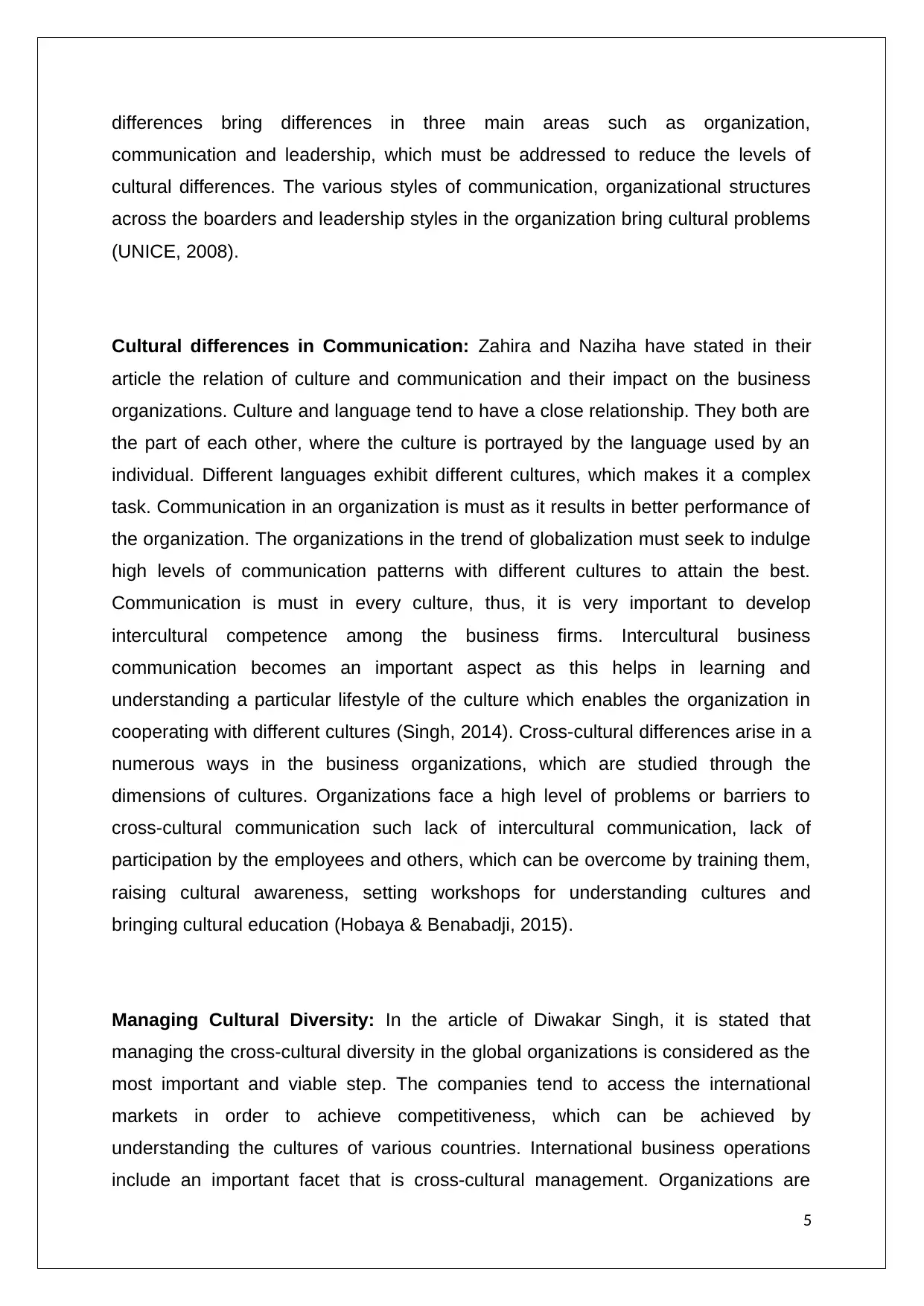
differences bring differences in three main areas such as organization,
communication and leadership, which must be addressed to reduce the levels of
cultural differences. The various styles of communication, organizational structures
across the boarders and leadership styles in the organization bring cultural problems
(UNICE, 2008).
Cultural differences in Communication: Zahira and Naziha have stated in their
article the relation of culture and communication and their impact on the business
organizations. Culture and language tend to have a close relationship. They both are
the part of each other, where the culture is portrayed by the language used by an
individual. Different languages exhibit different cultures, which makes it a complex
task. Communication in an organization is must as it results in better performance of
the organization. The organizations in the trend of globalization must seek to indulge
high levels of communication patterns with different cultures to attain the best.
Communication is must in every culture, thus, it is very important to develop
intercultural competence among the business firms. Intercultural business
communication becomes an important aspect as this helps in learning and
understanding a particular lifestyle of the culture which enables the organization in
cooperating with different cultures (Singh, 2014). Cross-cultural differences arise in a
numerous ways in the business organizations, which are studied through the
dimensions of cultures. Organizations face a high level of problems or barriers to
cross-cultural communication such lack of intercultural communication, lack of
participation by the employees and others, which can be overcome by training them,
raising cultural awareness, setting workshops for understanding cultures and
bringing cultural education (Hobaya & Benabadji, 2015).
Managing Cultural Diversity: In the article of Diwakar Singh, it is stated that
managing the cross-cultural diversity in the global organizations is considered as the
most important and viable step. The companies tend to access the international
markets in order to achieve competitiveness, which can be achieved by
understanding the cultures of various countries. International business operations
include an important facet that is cross-cultural management. Organizations are
5
communication and leadership, which must be addressed to reduce the levels of
cultural differences. The various styles of communication, organizational structures
across the boarders and leadership styles in the organization bring cultural problems
(UNICE, 2008).
Cultural differences in Communication: Zahira and Naziha have stated in their
article the relation of culture and communication and their impact on the business
organizations. Culture and language tend to have a close relationship. They both are
the part of each other, where the culture is portrayed by the language used by an
individual. Different languages exhibit different cultures, which makes it a complex
task. Communication in an organization is must as it results in better performance of
the organization. The organizations in the trend of globalization must seek to indulge
high levels of communication patterns with different cultures to attain the best.
Communication is must in every culture, thus, it is very important to develop
intercultural competence among the business firms. Intercultural business
communication becomes an important aspect as this helps in learning and
understanding a particular lifestyle of the culture which enables the organization in
cooperating with different cultures (Singh, 2014). Cross-cultural differences arise in a
numerous ways in the business organizations, which are studied through the
dimensions of cultures. Organizations face a high level of problems or barriers to
cross-cultural communication such lack of intercultural communication, lack of
participation by the employees and others, which can be overcome by training them,
raising cultural awareness, setting workshops for understanding cultures and
bringing cultural education (Hobaya & Benabadji, 2015).
Managing Cultural Diversity: In the article of Diwakar Singh, it is stated that
managing the cross-cultural diversity in the global organizations is considered as the
most important and viable step. The companies tend to access the international
markets in order to achieve competitiveness, which can be achieved by
understanding the cultures of various countries. International business operations
include an important facet that is cross-cultural management. Organizations are
5
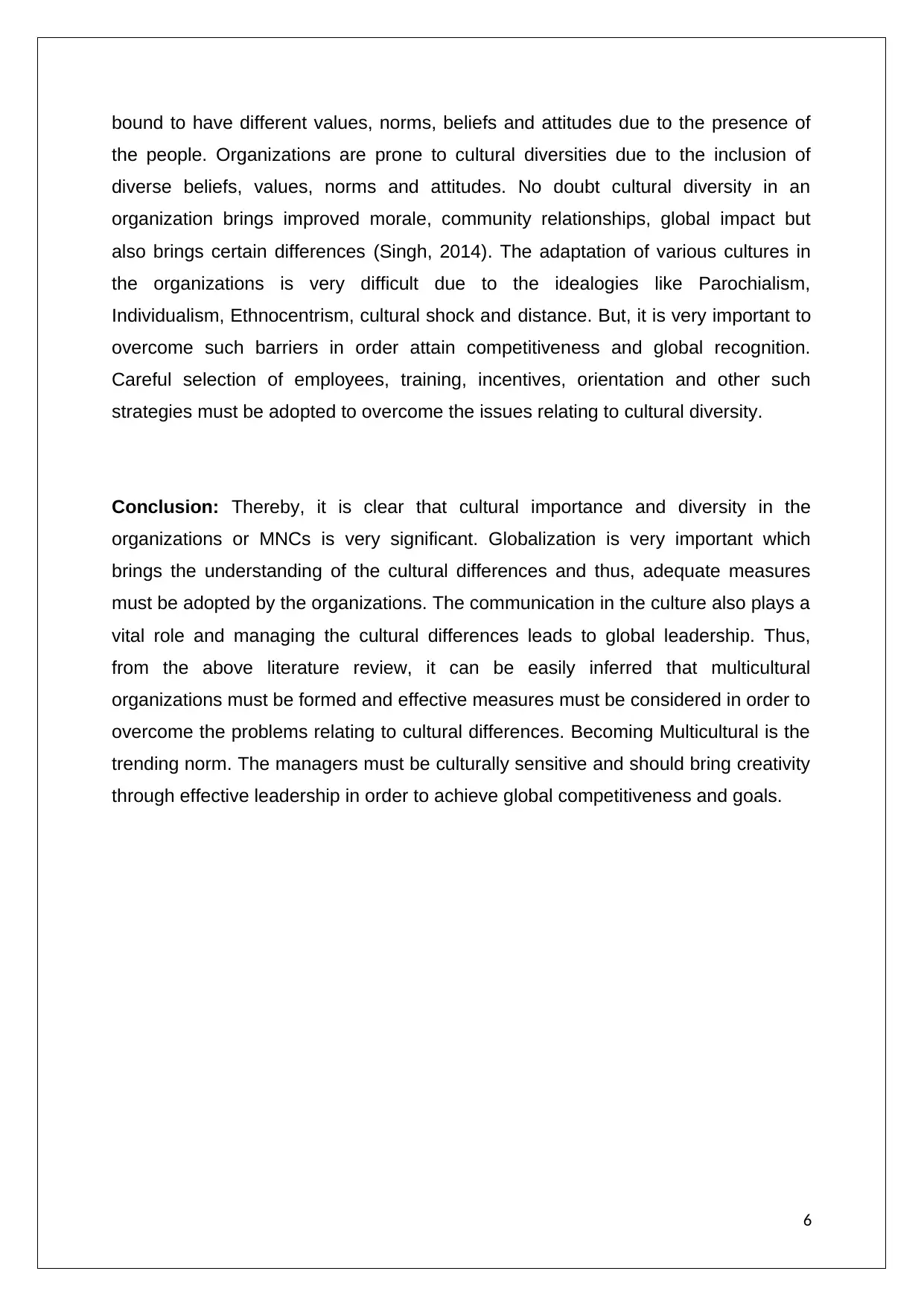
bound to have different values, norms, beliefs and attitudes due to the presence of
the people. Organizations are prone to cultural diversities due to the inclusion of
diverse beliefs, values, norms and attitudes. No doubt cultural diversity in an
organization brings improved morale, community relationships, global impact but
also brings certain differences (Singh, 2014). The adaptation of various cultures in
the organizations is very difficult due to the idealogies like Parochialism,
Individualism, Ethnocentrism, cultural shock and distance. But, it is very important to
overcome such barriers in order attain competitiveness and global recognition.
Careful selection of employees, training, incentives, orientation and other such
strategies must be adopted to overcome the issues relating to cultural diversity.
Conclusion: Thereby, it is clear that cultural importance and diversity in the
organizations or MNCs is very significant. Globalization is very important which
brings the understanding of the cultural differences and thus, adequate measures
must be adopted by the organizations. The communication in the culture also plays a
vital role and managing the cultural differences leads to global leadership. Thus,
from the above literature review, it can be easily inferred that multicultural
organizations must be formed and effective measures must be considered in order to
overcome the problems relating to cultural differences. Becoming Multicultural is the
trending norm. The managers must be culturally sensitive and should bring creativity
through effective leadership in order to achieve global competitiveness and goals.
6
the people. Organizations are prone to cultural diversities due to the inclusion of
diverse beliefs, values, norms and attitudes. No doubt cultural diversity in an
organization brings improved morale, community relationships, global impact but
also brings certain differences (Singh, 2014). The adaptation of various cultures in
the organizations is very difficult due to the idealogies like Parochialism,
Individualism, Ethnocentrism, cultural shock and distance. But, it is very important to
overcome such barriers in order attain competitiveness and global recognition.
Careful selection of employees, training, incentives, orientation and other such
strategies must be adopted to overcome the issues relating to cultural diversity.
Conclusion: Thereby, it is clear that cultural importance and diversity in the
organizations or MNCs is very significant. Globalization is very important which
brings the understanding of the cultural differences and thus, adequate measures
must be adopted by the organizations. The communication in the culture also plays a
vital role and managing the cultural differences leads to global leadership. Thus,
from the above literature review, it can be easily inferred that multicultural
organizations must be formed and effective measures must be considered in order to
overcome the problems relating to cultural differences. Becoming Multicultural is the
trending norm. The managers must be culturally sensitive and should bring creativity
through effective leadership in order to achieve global competitiveness and goals.
6
⊘ This is a preview!⊘
Do you want full access?
Subscribe today to unlock all pages.

Trusted by 1+ million students worldwide
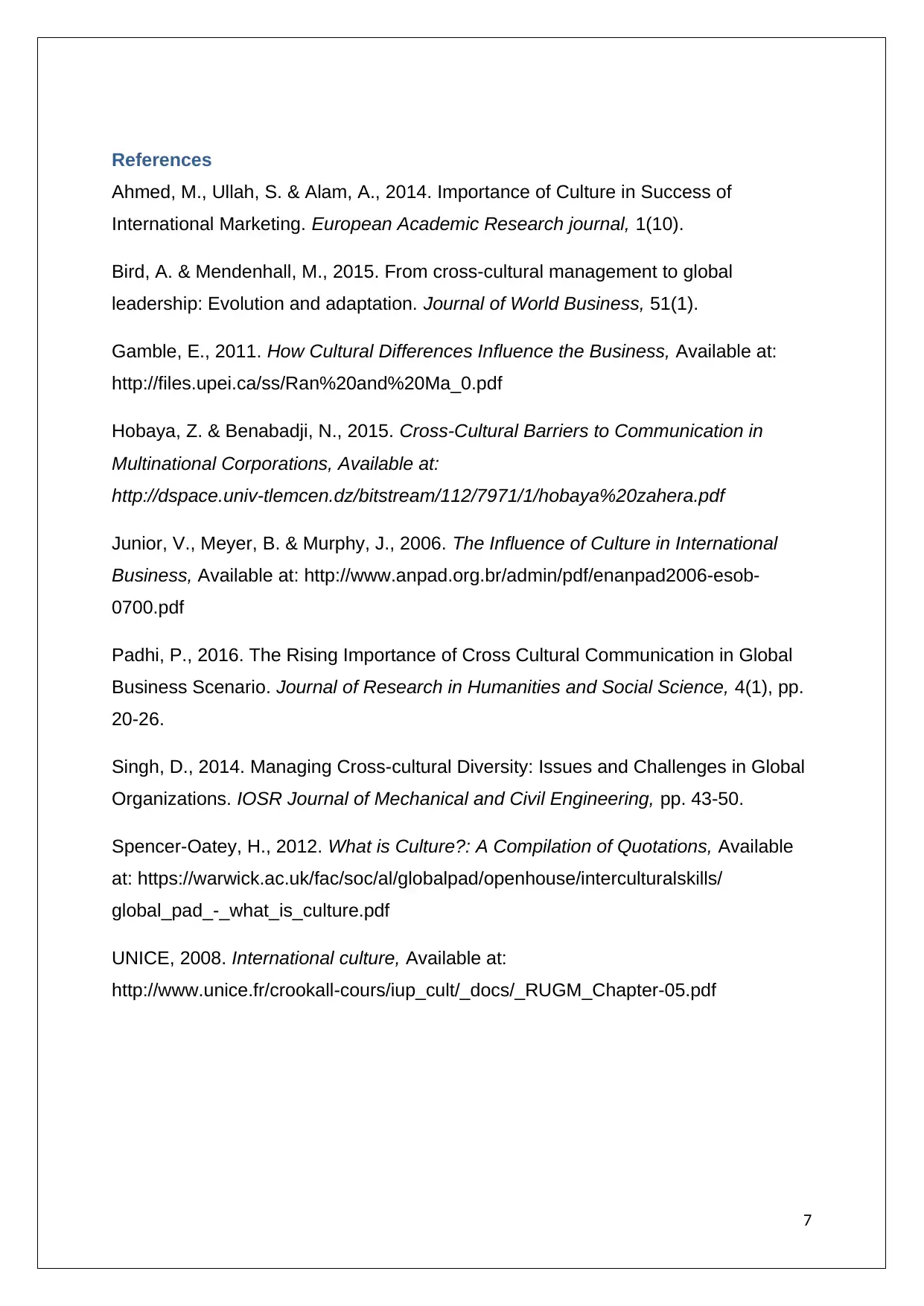
References
Ahmed, M., Ullah, S. & Alam, A., 2014. Importance of Culture in Success of
International Marketing. European Academic Research journal, 1(10).
Bird, A. & Mendenhall, M., 2015. From cross-cultural management to global
leadership: Evolution and adaptation. Journal of World Business, 51(1).
Gamble, E., 2011. How Cultural Differences Influence the Business, Available at:
http://files.upei.ca/ss/Ran%20and%20Ma_0.pdf
Hobaya, Z. & Benabadji, N., 2015. Cross-Cultural Barriers to Communication in
Multinational Corporations, Available at:
http://dspace.univ-tlemcen.dz/bitstream/112/7971/1/hobaya%20zahera.pdf
Junior, V., Meyer, B. & Murphy, J., 2006. The Influence of Culture in International
Business, Available at: http://www.anpad.org.br/admin/pdf/enanpad2006-esob-
0700.pdf
Padhi, P., 2016. The Rising Importance of Cross Cultural Communication in Global
Business Scenario. Journal of Research in Humanities and Social Science, 4(1), pp.
20-26.
Singh, D., 2014. Managing Cross-cultural Diversity: Issues and Challenges in Global
Organizations. IOSR Journal of Mechanical and Civil Engineering, pp. 43-50.
Spencer-Oatey, H., 2012. What is Culture?: A Compilation of Quotations, Available
at: https://warwick.ac.uk/fac/soc/al/globalpad/openhouse/interculturalskills/
global_pad_-_what_is_culture.pdf
UNICE, 2008. International culture, Available at:
http://www.unice.fr/crookall-cours/iup_cult/_docs/_RUGM_Chapter-05.pdf
7
Ahmed, M., Ullah, S. & Alam, A., 2014. Importance of Culture in Success of
International Marketing. European Academic Research journal, 1(10).
Bird, A. & Mendenhall, M., 2015. From cross-cultural management to global
leadership: Evolution and adaptation. Journal of World Business, 51(1).
Gamble, E., 2011. How Cultural Differences Influence the Business, Available at:
http://files.upei.ca/ss/Ran%20and%20Ma_0.pdf
Hobaya, Z. & Benabadji, N., 2015. Cross-Cultural Barriers to Communication in
Multinational Corporations, Available at:
http://dspace.univ-tlemcen.dz/bitstream/112/7971/1/hobaya%20zahera.pdf
Junior, V., Meyer, B. & Murphy, J., 2006. The Influence of Culture in International
Business, Available at: http://www.anpad.org.br/admin/pdf/enanpad2006-esob-
0700.pdf
Padhi, P., 2016. The Rising Importance of Cross Cultural Communication in Global
Business Scenario. Journal of Research in Humanities and Social Science, 4(1), pp.
20-26.
Singh, D., 2014. Managing Cross-cultural Diversity: Issues and Challenges in Global
Organizations. IOSR Journal of Mechanical and Civil Engineering, pp. 43-50.
Spencer-Oatey, H., 2012. What is Culture?: A Compilation of Quotations, Available
at: https://warwick.ac.uk/fac/soc/al/globalpad/openhouse/interculturalskills/
global_pad_-_what_is_culture.pdf
UNICE, 2008. International culture, Available at:
http://www.unice.fr/crookall-cours/iup_cult/_docs/_RUGM_Chapter-05.pdf
7
1 out of 7
Related Documents
Your All-in-One AI-Powered Toolkit for Academic Success.
+13062052269
info@desklib.com
Available 24*7 on WhatsApp / Email
![[object Object]](/_next/static/media/star-bottom.7253800d.svg)
Unlock your academic potential
Copyright © 2020–2026 A2Z Services. All Rights Reserved. Developed and managed by ZUCOL.





